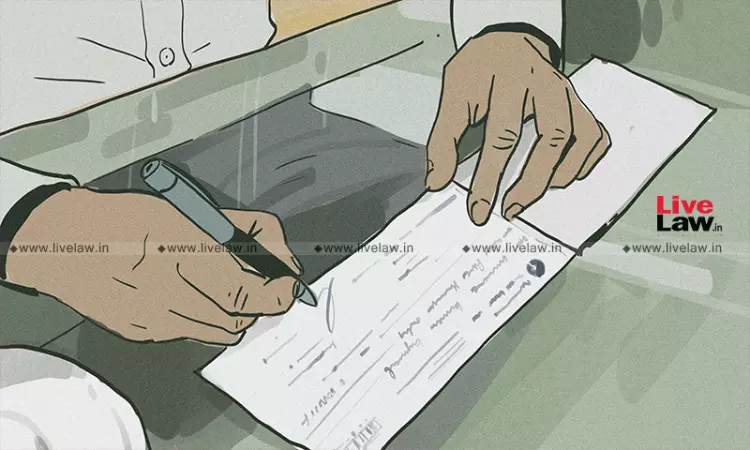- Home
- /
- High Courts
- /
- Chhattisgarh High Court
- /
- Section 138 NI Act | Infirmity In...
Section 138 NI Act | Infirmity In Cheque Return Memo Does Not Render Entire Trial For Cheque Dishonour A Nullity: Chhattisgarh HC Reiterates
Saahas Arora
10 April 2025 11:01 AM IST
The Chhattisgarh High Court has reiterated held that even if there is an infirmity in the cheque return memo, it would not render the entire trial under Section 138 Negotiable Instruments Act for cheque dishonour as nullity.Justice Narendra Kumar Vyas in his order observed that the trial court in the instant case had held that the cheques were given towards liability not as security as...
The Chhattisgarh High Court has reiterated held that even if there is an infirmity in the cheque return memo, it would not render the entire trial under Section 138 Negotiable Instruments Act for cheque dishonour as nullity.
Justice Narendra Kumar Vyas in his order observed that the trial court in the instant case had held that the cheques were given towards liability not as security as the accused is unable to rebut the same and could not adduce substantive evidence to affirm his stand that the cheques were given towards security.
"Thus, the presumption under Section 139 of N.I. Act, 1881 is held to be in favour of complainant, therefore, merely due to no seal and signature of cheque return forwarding memo by the bank, the finding of the trial Court that no presumption regarding dishonor of cheques can be drawn, is misconceived," the court underscored.
The court explained that the purpose of a cheque return memo is to inform the holder of the cheques that his cheques on presentation could not be encashed due to various reasons as may be mentioned in the memo.
“Even as per Section 146 of N.I. Act, 1881, the cheques return on presentation presumed the fact of dishonor of cheques unless and until such fact is disapproved. It is pertinent to mention here that neither Section 138 nor 146 of the N.I. Act, 1881 prescribed any particular form of cheque return memo, it is a nothing but a mere information given by the due holder of a cheques that cheques have been returned as unpaid. If the cheque return memo is not bearing any official stamp of the bank, it does not render the cheque return memo as invalid or illegal. The cheque return memo is not document which is required to be covered under Bankers Book (Evidence Act), 1891if there is any infirmity in the cheques return memo, it does not render entire trial under Section 138 of N.I. Act, 1881 as nullity," it said referred to Delhi High Court's decision in Guneet Bhasin Vs. State of NCT of Delhi & Anr. & Ors and Madras High Court's decision in India Cements Investments Services Limited Vs. T. P. Nallusamy.
Initially, a complaint was filed under Section 138 of the NI Act, whereby, the complainant–who was doing business of cement, bricks and supply of construction material–complained that the accused had taken material worth Rs. 67,470 and 1,70,600 and to discharge the said liability the accused had given the said cheques. These cheques were dishonoured due to insufficient funds, post which, the complainant sent a legal notice to the accused. Despite service of notice, neither the amount was paid nor any reply was given.
The Trial Court dismissed the complaint on the ground that there was no seal of the bank forwarding memo, signature of the bank officer nor any bank officer had been examined which constituted a violation of Section 146 NI Act. While dismissing the complaint, the trial court recorded that the amount mentioned in the dishonoured cheques had not been paid by the accused within the time prescribed under Section 138 and held that the cheques were given towards debt or liability, but dismissed the complaint and acquitted the accused. Aggrieved by the said acquittal, the appellant approached the High Court.
The High Court was to thus determine whether the trial Court was justified in dismissing the complaint by not relying upon the cheque returning memo as it did not bear the seal and signature of the bank official to attract Section 146 of the NI Act.
The Court held that the trial Court's order pertaining to the cheques being given towards liability suffered from no illegality, however, the presumption under Section 138 of the NI Act was held to be in favour of the complainant, because, “merely due to no seal and signature of cheque return forwarding memo by the bank, the finding of the trial Court that no presumption regarding dishonor of cheques can be drawn, is misconceived.”
The Court thus quashed the trial Court's decision in as much as it related to the presumption under Section 138 of NI not being raised when the cheque forwarding memo does not bear the seal and signature of bank officials.
Partly affirming the trial Court's order, the Court remitted back the matter to the trial Court only to prove that cheques were presented before the bank and were dishonored due to “insufficient funds” in the account by examining the officer of the bank along with records maintained in the bank.
Case Details:
Case Number: ACQA No. 425 of 2024
Case Title: Tulshi Steel Traders Propritor Pushpendra Kesharwani v. Purva Construction Propritor -Mitrabhan Sahu
Date: 08.04.2025



